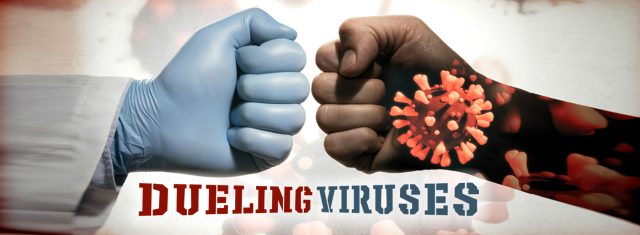 OXFORD, Miss. – October has arrived, and that means flu season in Mississippi is just around the corner. This year has a twist: Another, more infectious virus that causes a more dangerous respiratory illness has already been spreading for months.
OXFORD, Miss. – October has arrived, and that means flu season in Mississippi is just around the corner. This year has a twist: Another, more infectious virus that causes a more dangerous respiratory illness has already been spreading for months.
How might COVID-19 change the 2020-21 flu season?
For starters, it might be more important than ever to get a flu shot this year, said Dr. Joyce Olutade, director of Student Employee Health at the University of Mississippi Medical Center.
“We are really pushing for everyone to receive their flu shot by the end of October,” Olutade said.
Influenza activity in Mississippi typically peaks between December and February, but some years the peak comes earlier, Olutade said. It takes the vaccine about two weeks to produce a robust immune response, so the sooner you can get a vaccine, the better.
“If you receive your flu vaccine too close to the time of virus exposure, it may not be as protective,” she said.
Anyone who can receive an influenza vaccine should get one, said Olutade, an assistant professor of family medicine at UMMC. People older than 65, children older than 6 months, pregnant women and people with pre-existing conditions such as asthma, chronic obstructive pulmonary disease and diabetes should especially seek a vaccine this year.
The UM chapter of the American Pharmacists Association Academy of Student Pharmacists is conducting its annual Operation Immunization to provide flu shots to the Ole Miss community. The cost is $40, which can be billed to most insurance plans. Students, faculty and staff should bring their Ole Miss ID and prescription insurance card. Costs not covered by insurance can be charged to Bursar accounts.
The vaccine will be offered in a drive-thru setup at the South Oxford Center Parking Garage at 2301 S. Lamar Blvd. COVID-19 symptoms and temperatures will be checked. Operation Immunization will take place from 1 to 4 p.m. Oct. 6, 15, 21 and 27.
The flu vaccine is also available at Pharmacy Health Services, inside the V.B. Harrison Health Center on campus, during its regular hours of operation: 7:30 a.m.-5 p.m. Mondays-Thursdays and 9 a.m.-5 p.m. Fridays.
There are multiple formulations, including those that provide more protection for people older than 65 or are safe for people with serious egg allergies.
While the flu vaccine will not prevent all cases of influenza, it does make the disease less severe for those who do contract the virus, Olutade said.
“When people receive the flu vaccine, they have a lower risk of being hospitalized or dying if they do get the flu,” she said.
The World Health Organization makes recommendations for the Northern Hemisphere’s annual version of the vaccine based on the strains that are most prevalent during the Southern Hemisphere’s flu season. Usually, doctors can look at flu activity there, which peaks between April and September, to predict the disease’s impact in the north.
This may not be the case for 2020.
“In the Southern Hemisphere, we saw a relatively low-activity flu season this year,” Olutade said. “That may be because of mask-wearing, hand-washing and social distancing efforts during the COVID-19 pandemic.”
However, every person who can should still get a flu shot this fall, she said. First, personal hygiene practices are the only defensive measures individuals can take to prevent COVID-19 spread and infection.
“We have a vaccine for the flu, but we don’t have one for COVID-19,” Olutade said.
Second, COVID-19 is still widespread. SARS-CoV-2 has infected more than 6 million people and has caused more than 200,000 deaths in the United States. Experts predict the pandemic will extend into 2021. On top of that, according to the Centers for Disease Control and Prevention, influenza causes hundreds of thousands of hospitalizations and tens of thousands of deaths each year.
With both viruses spreading through the population, bed space in hospitals could be more limited than usual, Olutade said.
Another complicating difference exists between the Southern Hemisphere’s flu season and the one starting in the U.S, said Dr. Bhagyashri Navalkele, medical director of infection prevention and control and assistant professor of medicine at UMMC.
“We have schools reopening, colleges and universities reopening, movie theaters reopening,” Navalkele said. “Not everyone is masking and following social distancing, and that letting down of your guard can have an impact on flu spreading.”
If most people get a flu shot and follow COVID-19 prevention recommendations, there is a chance for a milder flu season in Mississippi, Navalkele said.
“If not, we might see a good number of cases in addition to COVID,” she said. “If you get flu and COVID together and you have risk factors and are older, then your risk for survival might be low.”